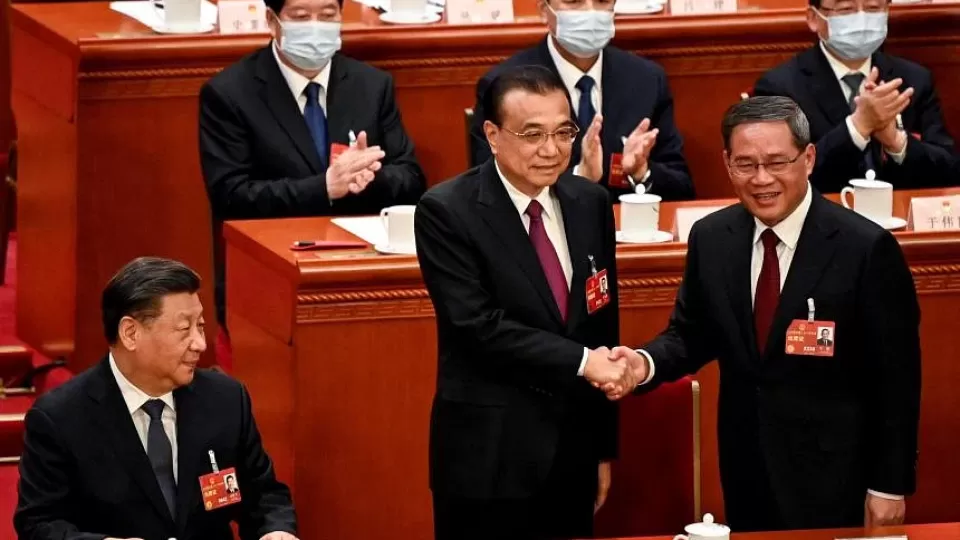March 13, 2023
BEIJING – China’s Parliament approved on Saturday Mr Li Qiang as premier, with a remit to jump-start the world’s second-biggest economy that has been battered by tough pandemic-related measures and worsening relations with the United States.
As many as 2,936 members of the National People’s Congress (NPC) voted to make Mr Li the country’s eighth premier since 1949. Three voted against, with eight abstentions.
Mr Li, 63, is a trusted loyalist of President Xi Jinping, with whom he spoke extensively during Saturday’s voting session. He succeeds Premier Li Keqiang, 67, who retires after having served the maximum two five-year terms.
Mr Li Keqiang was approved as premier in 2013 with three votes against and six abstentions, while his predecessor Wen Jiabao received three negative votes and 16 abstentions in 2003. In 1998, 29 members of the NPC voted against Mr Zhu Rongji while 31 abstained from voting.
Analysts argue that Mr Li Qiang could be given more leeway to manage the economy than his immediate predecessor, whose final few years as premier were beset with crises such as the US-China trade war and the Covid-19 pandemic, and who was seen as being marginalised by Mr Xi.
Dr Zafar Momin, adjunct associate professor at the National University of Singapore Business School, said: “As President Xi’s closest protege, Mr Li can be fully trusted to execute the ruling party’s economic and ideological agenda.”
Dr Zafar, who has more than 20 years of work experience in China and follows the country’s economic development closely, added: “Mr Li is in an instrumental role to drive President Xi’s economic agenda for China’s future growth.”
Mr Li Qiang’s previous postings have helped build his reputation as a pro-business politician. He served as party secretary of Shanghai from 2017 to 2022, after stints as governor of nearby Zhejiang province – an economic powerhouse – and then party secretary of booming Jiangsu province.
But questions have been raised over his experience in running China’s vast economy, given that he skipped the traditional intermediary step of serving a term as vice-premier before becoming premier.
The rise of his political star surprised pundits after his standing took a hit in 2022, when Shanghai went through a poorly managed two-month lockdown under his watch. Some 25 million residents could not get food and proper medical care in the early weeks of the lockdown, causing fights and protests to erupt in some neighbourhoods.
He took Mr Li Keqiang’s second-ranked seat in the Communist Party of China’s (CPC) Politburo Standing Committee – the apex of power in the country – during the party’s 20th national congress in October 2022.
The two Lis are not related.
Parliament also approved People’s Liberation Army (PLA) generals Zhang Youxia and He Weidong as vice-chairmen of the state Central Military Commission (CMC), which heads the PLA and the paramilitary People’s Armed Police.
Gen Zhang, 72, who is over the retirement age of 68 but has combat experience from the 1979 Chinese invasion of Vietnam, was retained by President Xi, as China gears up for possible conflict with the United States over self-ruled Taiwan, which Beijing claims as its own.
Both Mr Xi and Gen Zhang come from Shaanxi province; they are “princelings” – children of former senior officials who fought together in the Chinese Civil War in the 1940s.
Gen He was not even a delegate to the 2022 congress, but was surprisingly promoted, ostensibly because he is familiar with battle plans for possible military action against Taiwan, as he was in charge of the Eastern Theatre Command from 2019 to 2022.
Both generals sit on the CPC’s 24-member Politburo, which is ranked one notch below the Standing Committee.
Parliament also approved four members of the state CMC: Gen Li Shangfu, who is tipped to be named defence minister on Sunday, Gen Liu Zhenli, Admiral Miao Hua, and Gen Zhang Shengmin.
All six men were elected to the party’s CMC in 2022.
Mr Zhang Jun was elected president of the Supreme People’s Court and Mr Ying Yong, president of the Supreme People’s Procuratorate – China’s top prosecutor.
Mr Liu Jinguo was appointed chairman of the government’s anti-corruption watchdog, the National Supervisory Commission.
On Saturday afternoon, China’s top political advisory body – the Chinese People’s Political Consultative Committee (CPPCC) – also held its closing ceremony after about a week of meetings to propose policy solutions for challenges the country is facing, such as a bruised economy and declining population.
Mr Wang Huning, who is ranked fourth in the Politburo Standing Committee, was elected on Friday as the CPPCC’s new chairman. He took over the position from Mr Wang Yang, a former vice-premier.

